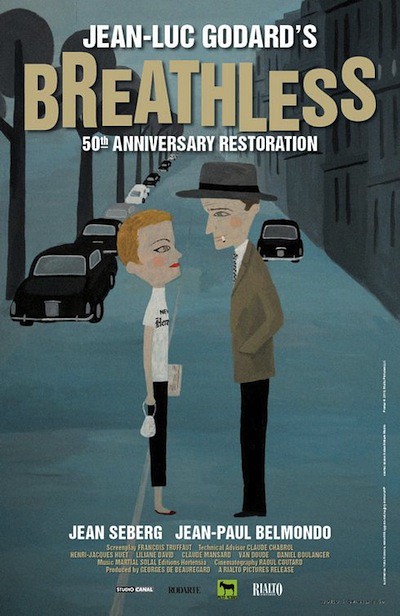
In his recent review of the 50th anniversary touring print of Jean-Luc Godard's Breathless, Michael Phillips quotes Jean-Paul Belmondo's dialogue from the film, when he tells Jean Seberg "I wanted to see if I'd be glad to see you again." Hearing that made Phillips realize how glad he was to be screening the movie after many years. "Turns out I was dying to see Breathless again," he writes, "and didn't even know it."
I feel the same way every time I see Breathless. It's been less than three years between viewings for me, having last watched Godard's 1960 masterpiece back when Criterion reissued the film in 2007 [review]. It's the kind of movie you think you know backwards and forwards until you start it up and realize how much of it you have forgotten and just how much cinema is there to sink your teeth into.
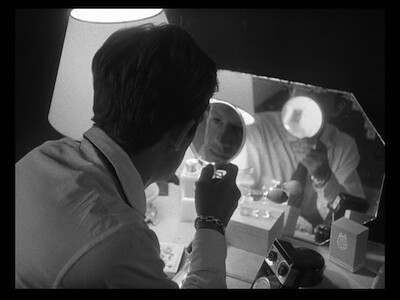
Despite owning the aforementioned DVD, I ventured out to the theatre to catch a screening of the new restoration, which opens at Cinema 21 here in Portland on August 13 [other tour dates here]. It was my first time seeing it on a movie screen, and given what a tremendous experience I had in recent months with the restorations of both Ran [review] and The Red Shoes [review], I thought it would be incredibly foolish to pass up on the opportunity. The new print, supervised by cinematographer Raoul Coutard, is everything one could hope it would be. I am not sure it is necessarily better than the DVD version, the previous restoration was phenomenal, but here is an opportunity to see the same clarity writ large. The Breathless I saw looked exceptional, and there wasn't a scratch on it.
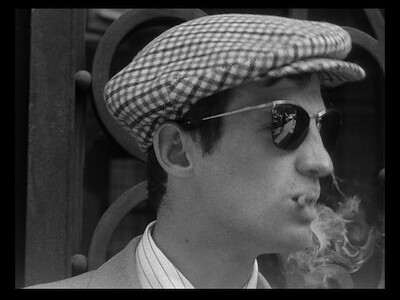
What continues to surprise me about Godard's audacious debut is that, every time I partake of it, I find new things to focus on. His tale of a two-bit gangster (Belmondo) and the American girl (Seberg) he hides out with is so full of story and character, I don't anticipate ever running out of angles to approach it from. Breathless is an extended conversation between Godard and his audience. He sets up Belmondo as his proxy, and the actor uses the early part of the film to talk directly to us. We are his partners in crime, his confidantes, and in a way, he seduces us, we are another of his many pick-ups. He steals a car and takes us for a ride; likewise, Jean-Luc Godard hijacked cinema and never gave it back.
For as charismatic as Belmondo is, this time around I found myself focusing on Jean Seberg. I can't imagine that I never picked up on the fact that her character, Patricia, was pregnant when I saw the movie before--she even outright says so--but then, I didn't mention it in my last review, which is kind of weird. This time around I clued in right away, as soon as her friend the reporter (whom Belmondo is right about, he doesn't seem on the up and up) gives her the novel and says it's about a girl like her and hopes that her situation won't go the same way. A little light bulb went off, and by keeping that light on, I was able to appreciate Seberg's performance in a whole new way. Patricia isn't merely the romantic ideal whose very arrival on screen is trumpeted by a surge of music, but someone far more complex than I realized.
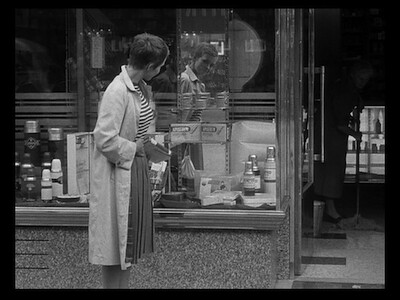
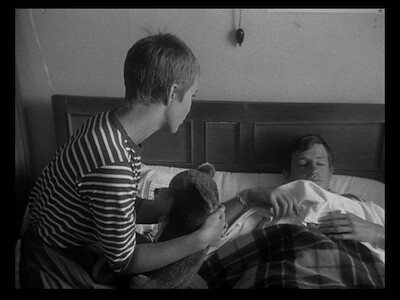
Watch Seberg in the scenes immediately after her meeting with the reporter. Everything she does shows how much the pregnancy is on her mind, be it the obvious action of examining her figure in a window reflection or more subtle, like the way she sits on the bed with Belmondo and clutches a teddy bear to her chest. One can guess that dreams of domestic bliss are forming in her head, and she is being so feisty with him because she wants to know that he really cares. Unsurprisingly, he reacts badly when she tells him what is happening, and the subject never comes up again. More telling, Patricia's whole demeanor changes afterward, she forgets herself and subsumes her needs to fit his. She becomes part of his childish plot. What she does at the end of the picture isn't nearly as capricious as it might seem: she is getting herself back and making a decision to get away from a man who will never grow up. That last look she gives, then, just might be her realizing she can never get away, she will carry him with her in a very real way.
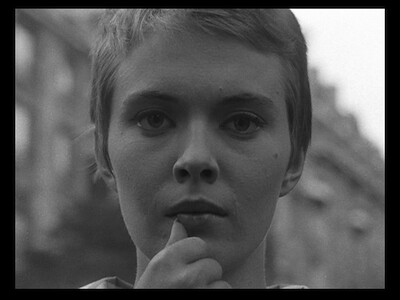
Belmondo certainly doesn't seem like a guy who has a firm commitment to commitment. Most of the first act shows him running away, be it from other girls or from the scene of the crime. Only Patricia makes him stop, and that's mainly because he thinks he can't have her and can't stand that others want her. The movie is Breathless because he is rushing from start to finish. What is he rushing to, though? His adolescent dreams of being the big man, of being an epic gangster or a full-on movie star, like Humphrey Bogart? Given how he ends up, though, maybe James Cagney
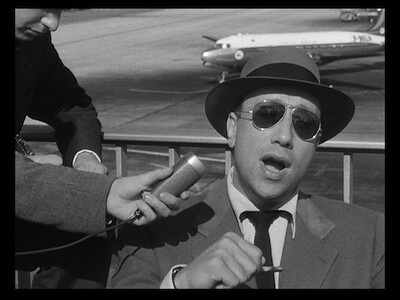
It wasn't Belmondo's character, though, who gave us the quote "To become immortal...and then die." That was Jean-Pierre Melville playing the pretentious novelist. (Excepting this nugget, the rest of his dialogue is the funniest material in the movie.) It's an immature vision of success. Rimbaud, James Dean--better to burn out than fade away. Yet, it's not really Belmondo's playtime hood that is achieving the immortality, it's Godard. Breathless was the young filmmaker's arrival, and he essentially manhandled cinema the way Belmondo mugged that guy in the bathroom, taking what he needed and otherwise leaving the victim for dead.
Even now, most films don't have the vim that Breathless has. It keeps moving, pushing through the streets of Paris, ferreting out its story. For as loose as the film can be, if you map out how the story works, how characters come in and out of the narrative, the way dialogue and action calls back to earlier scenes, you'll find that Godard has an impressive amount of control over what is being shown. It may be a coincidence that Belmondo drives by the girlfriend he robbed earlier just as she reads about his killing a cop in the newspaper, but really, there is no coincidence in story. That kind of thing is planned.
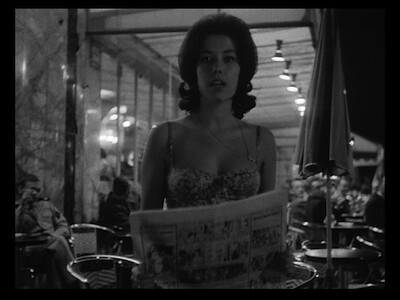
At the same time, there is an immediacy to the movie that can't be contrived or replicated. Notice how there are always people in the street watching the action, even glancing at the camera. Watching Breathless always feels like it is happening right at the moment, the movie never really occurred until just now when Belmondo looked into Coutard's lens and spoke to us. It's a storytelling quality that Godard owns like no one else, and you only have to watch the 1980s remake
It's also why Breathless feels new no matter when or how many times you watch it. You might forget that you are dying to see it again, as Michael Phillips did, but it won't take more than a few frames of film to remember.

For those who aren't getting the 50th anniversary print in their town, the movie is also being released by Criterion on Blu-ray
Also, take a look at the new trailer for this revival. It's a straight-up remake of the original 1960 trailer, but in English and with splashes of color. Kind of cool, kind of strange, but also kind of fun:
This film was reviewed thanks to a promotional screening hosted by Cinema 21.

No comments:
Post a Comment